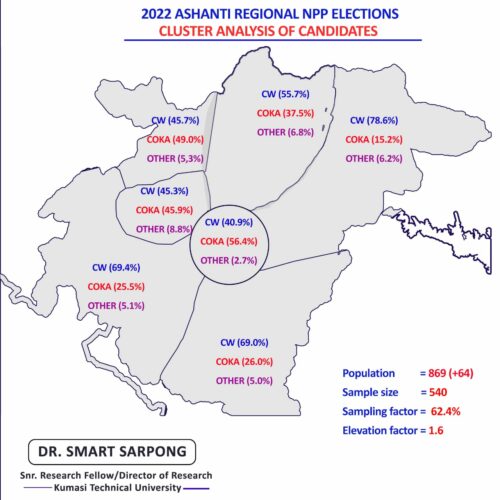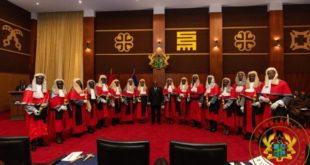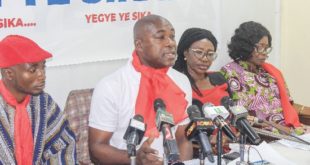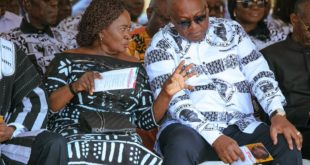Research conducted by a Senior Research Fellow with the Kumasi Technical University, Dr Smart Sarpong has predicted a win for the incumbent chairman for the New Patriotic Party (NPP) in Ashanti Region Bernard Antwi Bosiako(Wontumi) in the upcoming regional elections.
The NPP is going to the poll to elect new regional executives to govern the party for the next 4 years and Ashanti Regional Cordinating Council (RCC) has been confirmed by the Ashanti Regional Minister who is the Election Committee Chairman, Simon Osei Mensah as the venue for the elections on Friday, May 27.
According to the research many delegates says they will vote for the incumbent chairman Wontumi because they cannot blame him for the party performance during the 2020 elections but rather blame it on the National Executives failure to release election logistics on time.
They also use negative influence of independent candidates as a cause of their poor performance during the 2020 polls.
According to the research all aspirants had good messages, but many delegates believes that Chairman Wuntumi has the agility and resilience to overcome the machinations of the main opposition in Ashanti.
The research led by the Dr Smart Sarpong sampled the views of 540 out of possible 869 delegates.
The study also affords all aspirants the opportunity to marshal out strategies to overturn or consolidate their fortunes as presented.

Read the findings below:
NPP Polls: Who leads the NPP to break the 8
Who Leads The NPP To Break The 8 Scientific Evidence from Ashanti Region
Dr. Smart Sarpong (Snr. Research Fellow)
Kumasi Technical University
24th May 2022
PRESS STATEMENT
Introduction
Ladies and gentlemen of the PRESS, GOOD Morning
As a researcher I take interest in happenings around me and takes the pain to
determinate findings where the need be. This morning I present to you very
interesting findings from my visit to all the 47 constituencies that make up the
Ashanti Region. This regional election has some 3 unique characteristics.
- The NPP wishes to break the 8, and executives to be elected will be responsible
to ensuring that, the wishes become a reality.
- The incumbent is seeking to break the 8 in a competition with four (4) strong
men of almost equal stature.
- The Executives to be elected will have to come face to face with a likely tough
team from the opposition NDC in Ashanti.
The national party (NPP) recorded a net loss of -2.5 (2020: 51.2% vs. 2016: 53.7%)
and is seeking to improve on its performance in 2024. On the other hand, the
regional party (NPP) also recorded a net loss of -3.5 (2020: 72.8% vs. 2016: 76.3%)
and is seeking to improve on its performance in 2024. In fact, all constituencies in
Ashanti recorded a net loss in 2020 votes apart from Sekyere Afram Plains, Adanse
Asokwa and Oforikrom constituencies.
Based on the above, this study was undertaken to understand the choices of
delegates in respect of who leads them to possibly break the 8.
Methodology
Findings
REMARKS
- According to many delegates, Performance of the region in Elections 2020 was
more blamable on National than the person of the regional Chairman. Very
late release of Election logistics and negative influence of independent
candidates are some of the causes.
- All aspirants had good messages, but many delegates believes that Chairman
Wuntumi has the agility and resilience to overcome the machinations of the
main opposition in Ashanti.
- The study affords all aspirants the opportunity to marshal out strategies to
overturn or consolidate their fortunes as presented.
WISHING ALL ASPIRANTS, THE BEST IN THE COMING REGIONAL ELECTIONS
NET WIN/LOSS ANALYSIS
NATIONAL
2020: 6,692,630 votes (51.2%)
2016: 5,766,107 votes (53.7%)
Loss: -2.5%
REGIONAL
2020: 1,793,629 votes (72.8%)
2016: 1,646,949 votes (76.3%)
Loss: -3.5%
CONSTITUENCIES
AFIGYA KWABRE NORTH
2020: 20,825 votes (67.0%)
2016: 18,658 votes (74.3%)
Loss: -7.3%
AFIGYA KWABRE SOUTH
2020: 68,378 votes (82.7%)
2016: 50,740 votes (85.9%)
Loss: -3.2%
OBUASI EAST
2020: 28,689 votes (67.4%)
2016: 27,952 votes (70.1%)
Loss: -2.7%
BEKWAI
2020: 55,923 votes (86.2%)
2016: 51,769 votes (89.3%)
Loss: -3.1%
ATWIMA NWABIAGYA NORTH
2020: 48,817 votes (78.0%)
2016: 38,604 votes (80.4%)
Loss: -2.4%
ATWIMA NWABIAGYA SOUTH
2020: 58,109 votes (80.2%)
2016: 48,172 votes (82.8%)
Loss: -2.6%
NEW EDUBIASE
2020: 17,713 votes (47.0%)
2016: 16,031 votes (49.4%)
Loss: -2.4%
ATWIMA MPONUA
2020: 37,457 votes (57.4%)
2016: 35,817 votes (63.1%)
Loss: -5.7%
ADANSI ASOKWA
2020: 19,519 votes (63.8%)
2016: 18,643 votes (61.8%)
Gain: +2.0%
AHAFO ANO NORTH
2020: 22,916 votes (54.3%)
2016: 20,380 votes (55.3%)
Loss: -1.0%
AHAFO ANO SOUTH-EAST
2020: 16,084 votes (55.5%)
2016: 14,538 votes (56.5%)
Loss: -1.0%
AHAFO ANO SOUTH-WEST
2020: 17,220 votes (57.9%)
2016: 16,044 votes (61.7%)
Loss: -3.8%
AKROFUOM
2020: 11,869 votes (58.5%)
2016: 11,177 votes (65.6%)
Loss: -7.1%
ODOTOBRI
2020: 32,037 votes (79.6%)
2016: 30,433 votes (86.7%)
Loss: -7.1%
OBUASI WEST
2020: 35,144 votes (72.1%)
2016: 34,660 votes (73.5%)
Loss: -1.4%
MANSO NKWANTA
2020: 34,386 votes (76.2%)
2016: 32,853 votes (85.1%)
Loss: -8.9%
MANSO ADUBIA
2020: 29,125 votes (65.3%)
2016: 27,672 votes (82.6%)
Loss: -17.3%
FOMENA
2020: 19,224 votes (74.3%)
2016: 16,098 votes (79.1%)
Loss: -4.8%
MANHYIA NORTH
2020: 40,425 votes (71.1%)
2016: 38,334 votes (75.6%)
Loss: -4.5%
MANHYIA SOUTH
2020: 27,932 votes (83.8%)
2016: 36,130 votes (86.2%)
Loss: -2.4%
ASOKWA
2020: 56,909 votes (80.6%)
2016: 56,242 votes (83.9%)
Loss: -3.3%
SUAME
2020: 65,733 votes (83.7%)
2016: 67,589 votes (87.2%)
Loss: -3.5%
SUBIN
2020: 43,051 votes (74.4%)
2016: 48,660 votes (78.3%)
Loss: -3.9%
OLD TAFO
2020: 42,363 votes (74.0%)
2016: 45,164 votes (77.9%)
Loss: -3.9%
BANTAMA
2020: 57,360 votes (86.2%)
2016: 51,696 votes (88.4%)
Loss: -2.2%
KWADASO
2020: 61,908 votes (87.1%)
2016: 61,072 votes (89.4%)
Loss: -2.3%
NHYIAESO
2020: 51,411 votes (81.0%)
2016: 48,538 votes (83.2%)
Loss: -2.2%
OFFINSO NORTH
2020: 20,010 votes (52.8%)
2016: 18,161 votes (53.9%)
Loss: -1.1%
OFFINSO SOUTH
2020: 38,692 votes (64.9%)
2016: 35,216 votes (68.6%)
Loss: -3.7%
KWABRE EAST
2020: 86,437 votes (77.4%)
2016: 71,112 votes (81.8%)
Loss: -4.4%
ATWIMA KWANWOMA
2020: 77,487 votes (83.4%)
2016: 54,252 votes (86.3%)
Loss: -2.9%
OFORIKROM
2020: 62,259 votes (73.1%)
2016: 61,191 votes (73.0%)
Gain: +0.1%
ASAWASE
2020: 35,214 votes (42.4%)
2016: 39,363 votes (54.0%)
Loss: -11.6%
EFFIDUASE-ASOKORE
2020: 27,003 votes (79.9%)
2016: 26,258 votes (82.0%)
Loss: -2.1%
EJISU
2020: 68,724 votes (82.1%)
2016: 55,312 votes (84.9%)
Loss: -2.8%
JUABEN
2020: 24,983 votes (76.6%)
2016: 23,340 votes (79.9%)
Loss: -3.3%
KUMAWU
2020: 23,502 votes (80.7%)
2016: 22,831 votes (81.9%)
Loss: -1.2%
SEKYERE AFRAM PLAINS
2020: 6,331 votes (40.4%)
2016: 3,172 votes (34.9%)
Gain: +5.5%
NSUTA-KWAMANG
2020: 22,043 votes (67.6%)
2016: 20,213 votes (70.0%)
Loss: -2.4%
MAMPONG
2020: 39,421 votes (75.6%)
2016: 37,378 votes (78.2%)
Loss: -2.6%
ASANTE AKYEM CENTRAL
2020: 31,450 votes (73.3%)
2016: 28,801 votes (79.1%)
Loss: -5.8%
ASANTE AKYEM SOUTH
2020: 35,516 votes (65.3%)
2016: 33,657 votes (68.3%)
Loss: -3.0%
ASANTE AKYEM NORTH
2020: 27,155 votes (69.8%)
2016: 25,876 votes (71.9%)
Loss: -2.1%
BOSOME FREHO
2020: 21,220 votes (76.6%)
2016: 19,593 votes (79.2%)
Loss: -2.6%
BOSOMTWE
2020: 57,939 votes (84.1%)
2016: 45,866 votes (85.0%)
Loss: -0.9%
EJURA –SEKYEDUMASE
2020: 25,079 votes (44.9%)
2016: 20,477 votes (45.4%)
Loss: -0.5%
AFIGYA SEKYERE EAST
2020: 42,637 votes (78.7%)
2016: 41,214 votes (79.6%)
Loss: -0.9%
Source: Ghanatodayonline.com
 Ghanatodayonline.com News, Politics, Health, Education & More
Ghanatodayonline.com News, Politics, Health, Education & More



